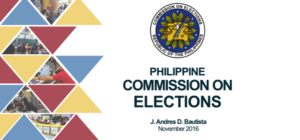In a world where information sharing is the new norm, opportunities to share experiences – and to learn from the experiences of others – are always welcome. It was in this spirit that I embraced the chance to travel to Maputo, Mozambique for the International Electoral Forum, organised by the International Centre for Policy Studies (ICPS) and the election commission of Mozambique.
It didn’t hurt that I’ve always had a love for Africa, but that’s neither here nor there.
Performance Scorecard
I was basically pinch-hitting for the Chairman of the COMELEC, so I brought his presentation deck along with me. You can download that in .pdf here >> COMELEC-Ph.
The presentation was remarkably well-received, and the assembled electoral management bodies from around the world had a lot of good observations and questions.
Take the performance scorecard, for instance. One of the senior election officials commended the strategy of putting together a performance scorecard, but noted that he “was not overly enthused” that it was the COMELEC itself doing the scorecard – a fair point which I conceded.
However, I clarified that the performance scorecard described in the presentation was an internal management tool which the COMELEC used in 2016 to map out – visualise, even – what the institution had done before, how it had fared, and what the areas for improvement were. There was nothing, I said, preventing third-parties from putting together their own scorecards to keep track of the COMELEC’s performance. However, that COMELEC itself was adopting the strategy emphasised the institutions strong desire to improve its own performance, by adopting a systematic means of self-examination.
Security thru transparency
Another delegate noted the number of political parties in the Philippines and asked how the COMELEC prevented votes from being “stolen.” Considering recent developments, I thought, that was a very on-the-nose kind of question and relished the opportunity to address it.
To respond, I started by pointing out the system of political watchers we employ here and segued into a brief description of how we leveraged the power of modern tech.
Elections in the Philippines, I explained, employed electronic transmission which assured that raw precinct results would be made available to the public – via the online Results Website – mere minutes after the close of polls. This, I continued, meant that the results could be checked by anyone and everyone long before any unscrupulous person could have an opportunity to tamper with the ballots.
Using a familiar analogy, I emphasised that we protect the integrity of the votes by adopting a regime of transparency, rather than obscurity. And with results being widely known so soon after the close of voting, any attempt to tamper with the outcome would be easily detectable and therefore, of no reasonable advantage or value. I also – rather optimistically, I have to admit – intimated that anyone who even tried to tamper with the results then would pay a very high political cost.
This, I hastened to add, did not foreclose the possibility of protests. However, the very transparency of the system does act to effectively minimise the uncertainty about the integrity of the count, which provides fuel to any electoral protest. At the end of the day, this had the net effect of reducing the number of protests filed – from 96 in 2010, to 67 in 2013, and finally to only 43 in 2016.

Not a small achievement, by any measure.
Vulnerable Sectors
Another thing which caught the audience’s attention was the COMELEC’s effort to protect the right of vulnerable sectors – particularly persons with disabilities (PWDs) and indigenous peoples (IPs).
In the matter of PWDs, one of the delegates was interested to know whether the COMELEC had PWD officers. I gladly pointed out the example of former Commissioner Grace Padaca, to prove that the COMELEC did not only protect the rights of PWD voters, but had also integrated PWDs into its very structure, all the way to the highest levels of the organization.
Learning from Others
Of course, the learning didn’t just go one-way. Listening to the discussions and other case studies all gave me a ton of things to think about that I am still, to be honest, processing. These things include new ways of defining electoral violence (although I contributed to this conceptually as well), new concepts relating to the independence of electoral commissions and the role these bodies play in shaping the electoral environment despite the lack of legislative powers, and insights into the use of technology to safeguard the rights of voters.
Over-all, this experience was one I count myself very fortunate to have had.

